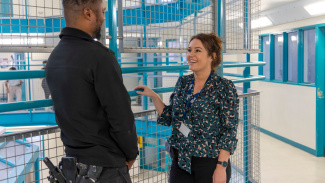Coachingofferspracticalsolutionstopressingissuessetoutinhard-hittingprisonreport
In a week when many prisons are releasing people early to ease short-term pressure on the system, the Chief Inspector’s annual report sets out in depressing detail the negative impact severe and long-lasting overcrowding is having on the people who live and work in our prisons.
It’s clear that these ‘brutalising conditions’ are being exacerbated by problems with staff retention, low morale, and limited access to professional development, training, and supervision. Shockingly, 30% of frontline staff met with their manager or mentor once a year or less. The report notes that the number of staff leaving within two years ‘remains worryingly high’ and inexperienced staff lack the confidence and support to build effective relationships with those in their care.
In addition, the astonishing lack of purposeful activity means many prisoners, including young people, are ‘trapped in a cycle of boredom, frustration and poor behaviour’ fuelling the demand for drugs and increased violence, debt and self-harm. The report sets out how a lack of rehabilitative and resettlement interventions sets people up to fail, making our communities less safe and further adding to the churn and overcrowding when people are recalled.
The Chief Inspector sets out clearly how some prisons have bucked this trend – through effective leadership and the development of positive cultures. The keys to success include interactions that are relational rather than transactional and interventions that provide hope. He has called for the new government to deliver ‘sustained, decisive action’.
The new prisons minister, Lord James Timpson OBE, knows what it takes to build staff morale. One practical thing he could do for under-supported prison staff and governors is access to coaching, which they tell us improves their motivation and confidence, and reduces stress.
To transform the culture of our prisons, the new minister will need to look at pragmatic, evidence-based solutions to build effective and trusting relationships between those who live and work there. In our coaching programme, The Conversation, our trained coaches use Deep Democracy approaches to facilitate productive dialogue between staff and prisoners, which enhances relationships, improves behaviour, and increases empathy.
Finally, the new prisons minister understands how to set people up for success after release, having established training academies in prisons and employed hundreds of people with convictions in his shops. Coaching programmes, like Spark Inside’s Hero’s Journey, can be an important way to build on individual strengths and make meaningful, achievable plans.
I hope this hard-hitting report is a catalyst for the urgent and systemic change we need in our prisons if we want people to leave prison ready to build a positive future away from crime. I urge the new prisons minister to work with charities, such as Spark Inside, to help nurture successful programmes that too often languish as ‘pockets of good practice’, but which could transform our prisons, and the lives of those living and working in them, if scaled up more widely.
Vicki Cardwell, CEO, Spark Inside


